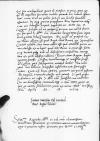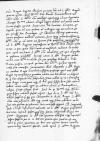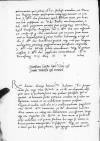Quae in proximo nostro ⌊conventu⌋ per reverendissimos et magnificos
 BJ, 6657, f. 399r
dominos regios ⌊legatos⌋ acta sunt,
ex meis ⌊⌋ ad serenissimam ⌊maiestatem regiam⌋, quas iis igitur, quod reverendissimus ⌊dominus Plocensis⌋ procancellarius non adsit, iunxi, Serenissima Maiestas Vestra intelleget; opportuneque ad eam legationem idem ipse reverendissimus advenit, alioqui negotii dubius vel potius turbulentus fuisset exitus. Sunt enim ⌊hic⌋ homines, civitates et oppida, quae ad eum modum, ut in ⌊regno⌋, cogi non volunt, et qui, priusquam sua privilegia et libertates infringi paterentur, omnia perferre mallent extrema. Fecit itaque providentissime Serenissima Maiestas Vestra, quod ad meam ex sincera fide profectam commendationem ad serenissimam ⌊maiestatem regiam⌋ intercesserit, ut reverendissimus ⌊dominus Plocensis⌋ mitteretur. A ⌊quo⌋, cum XXI huius, ut constituit, redierit, de multis, quae apud nos fiunt, Serenissima Maiestas Vestra edocebitur, et quae aliquando in posterum proderunt.
BJ, 6657, f. 399r
dominos regios ⌊legatos⌋ acta sunt,
ex meis ⌊⌋ ad serenissimam ⌊maiestatem regiam⌋, quas iis igitur, quod reverendissimus ⌊dominus Plocensis⌋ procancellarius non adsit, iunxi, Serenissima Maiestas Vestra intelleget; opportuneque ad eam legationem idem ipse reverendissimus advenit, alioqui negotii dubius vel potius turbulentus fuisset exitus. Sunt enim ⌊hic⌋ homines, civitates et oppida, quae ad eum modum, ut in ⌊regno⌋, cogi non volunt, et qui, priusquam sua privilegia et libertates infringi paterentur, omnia perferre mallent extrema. Fecit itaque providentissime Serenissima Maiestas Vestra, quod ad meam ex sincera fide profectam commendationem ad serenissimam ⌊maiestatem regiam⌋ intercesserit, ut reverendissimus ⌊dominus Plocensis⌋ mitteretur. A ⌊quo⌋, cum XXI huius, ut constituit, redierit, de multis, quae apud nos fiunt, Serenissima Maiestas Vestra edocebitur, et quae aliquando in posterum proderunt.
Scripsi etiam serenissimae ⌊maiestati regiae⌋, quibus modis eius maiestas traducta sit per quosdam Polonos in urbe ⌊Roma⌋ passim et apud ⌊quattuor illos cardinales⌋, quibus cognitio causae fuit commissa sacramentarii illius ⌊Alexandri⌋ a maiestate regia ex omnibus regiis ditionibus iustissime proscripti, quod eius maiestas regia repuerascens per grandem aetatem iam tota deliret ac desipiat; et quod licet aliquando litteras subscribat, tamen nullius rei in administratione ⌊regni⌋ curam gerat neque de litteris, quas subscribere solet, notitiam habeat, verum omnia agat ex arbitrio aliorum et ⌊procancellarii⌋. Reliqua scriptu indigna sunt, sed de iis reverendissimus ⌊dominus Plocensis⌋, cum sospes redierit, fusius referet.
Qua de re Serenissimae Maiestati Vestrae humillime supplico, si qui pro ⌊Alexandro⌋ in aula regia Serenissimam Maiestatem Vestram interpellaverint, illis neque aures neque fidem adhibere velit. Sunt enim quidam, qui plurimum ⌊huic⌋ manifesto corporis et sanguinis Iesu Christi hosti favent molientes, ut serenissimae ⌊maiestatis regiae⌋ proscriptionis decretum rescindi possit, quod sine summa indignitate regia non fieret. Quapropter Serenissimae Maiestati Vestrae, quantum demissius atque impensius possum, supplico pro ea in Deum pietate, qua praedita est, non velit se induci permittere, ut ⌊huic⌋ tam nefario homini convicto exsecrandoque haeretico quovis modo apud serenissimam ⌊maiestatem regiam⌋
 BJ, 6657, f. 399v
patrocinetur, quin potius ad hoc studiose intendere, ut decretum regium contra proscriptum integrum maneat et viri boni Serenissimae Maiestatis Vestrae servitores apud ⌊ecclesiam meam⌋ per hominem hunc pestiferum ex ⌊Urbe⌋ bullis non divexentur, a domino Deo perpetuam pietatis suae perceptura mercedem.
BJ, 6657, f. 399v
patrocinetur, quin potius ad hoc studiose intendere, ut decretum regium contra proscriptum integrum maneat et viri boni Serenissimae Maiestatis Vestrae servitores apud ⌊ecclesiam meam⌋ per hominem hunc pestiferum ex ⌊Urbe⌋ bullis non divexentur, a domino Deo perpetuam pietatis suae perceptura mercedem.
Quod ⌊praefectus Rogosnensis⌋ litteris Serenissimae Maiestatis Vestrae non responderit, causa est, quod illis emendatus iam ⌊uxorem⌋ suam humanius ac benevolentius quam prius, tractet; habemusque et ego, et illa Serenissimae Maiestati Vestrae humillimas gratias atque una pro longaeva incolumitate omniumque prosperrimorum successuum augmento Serenissimae Maiestatis Vestrae Deum sedulo exorabimus nosque in gratiam eiusdem Serenissimae Maiestatis Vestrae suppliciter commendamus.
 BJ, 6657, f. 399r
dominos regios
BJ, 6657, f. 399r
dominos regios  BJ, 6657, f. 399v
patrocinetur, quin potius ad hoc studiose intendere, ut decretum regium contra proscriptum integrum maneat et viri boni Serenissimae Maiestatis Vestrae servitores apud
BJ, 6657, f. 399v
patrocinetur, quin potius ad hoc studiose intendere, ut decretum regium contra proscriptum integrum maneat et viri boni Serenissimae Maiestatis Vestrae servitores apud 

